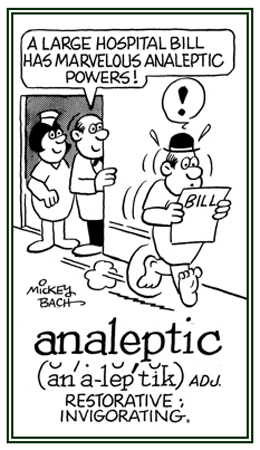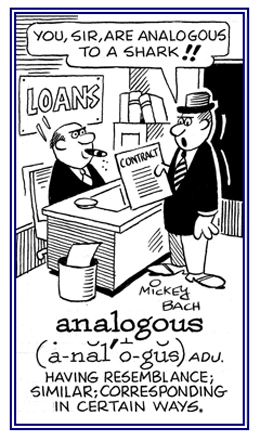ana-, an-, ano-, am-
(Greek: up, upward; back, backward, against; again, anew; used as a prefix)
anakinetomeres
Energy-rich atoms, molecules, or phrotoplasm.
analeptic (adjective), more analeptic, most analeptic
1. A drug that has a stimulating effect on the central nervous system: The laboratory was testing the new analeptic medication which was being developed in hopes of its successful use to stimulate the CNS of accident victims.
2. Restoring, invigorating, or giving strength after disease: An analeptic stimulation puts forth a restorative or invigorating action.

© ALL rights are reserved.
Go to this Word A Day Revisited Index
2. Restoring, invigorating, or giving strength after disease: An analeptic stimulation puts forth a restorative or invigorating action.

Go to this Word A Day Revisited Index
for a list of additional Mickey Bach illustrations.
analog, analogue
1. Relating to a system or device that represents data variation by a measurable physical quality.
2. Measuring or representing data by means of one or more physical properties which can express any value along a continuous scale; for example, the position of the hands of a clock is an analog representation of time.
3. An organ or structure that is similar in function to one in another kind of organism, but which is of a dissimilar evolutionary origin; such as, wings of birds and the wings of insects are analogs.
4. A chemical compound that has a similar structure and similar chemical properties to those of another compound, but which differs from it by a single element or group.
2. Measuring or representing data by means of one or more physical properties which can express any value along a continuous scale; for example, the position of the hands of a clock is an analog representation of time.
3. An organ or structure that is similar in function to one in another kind of organism, but which is of a dissimilar evolutionary origin; such as, wings of birds and the wings of insects are analogs.
4. A chemical compound that has a similar structure and similar chemical properties to those of another compound, but which differs from it by a single element or group.
The antibiotic amoxicillin, for example, is an analog of penicillin, differing from the latter by the addition of an amino group.
analogous (adjective), more analogous, most analogous
1. Descriptive of something that is akin, resembling or comparable to something else: Marian's smile was analogous to a ray of sunshine bursting from behind a cloud.
2. A reference to that which appears to be related or alike in some aspects: Wings of many flying animals or insects are analogous to each other in function, but definitely not in structure; such as, the wings of an insect and the wings of a bird.

© ALL rights are reserved.
Go to this Word A Day Revisited Index
2. A reference to that which appears to be related or alike in some aspects: Wings of many flying animals or insects are analogous to each other in function, but definitely not in structure; such as, the wings of an insect and the wings of a bird.

Go to this Word A Day Revisited Index
so you can see more of Mickey Bach's cartoons.
analogy
1. Similarities in some respects between things that are otherwise dissimilar and a comparison based on such similarities.
2. A form of logical inference or an instance of it, based on the assumption that if two things are known to be alike in some respects, then they must be alike in other respects.
3. The similarities in function, but differences in evolutionary origin, of body structures in different organisms; for example, the wing of a bird is analogous to the wing of an insect, since both are used for flight, however, there is no common ancestral origin in the evolution of these structures.
6. Etymology: from Latin analogia which came from Greek analogia, "proportion", from Greek ana-, "upon, according to" + Greek logos, "ratio"; also, "word, speech, reckoning".
2. A form of logical inference or an instance of it, based on the assumption that if two things are known to be alike in some respects, then they must be alike in other respects.
3. The similarities in function, but differences in evolutionary origin, of body structures in different organisms; for example, the wing of a bird is analogous to the wing of an insect, since both are used for flight, however, there is no common ancestral origin in the evolution of these structures.
While the wings of birds are modified skeletal forelimbs, insect wings are extensions of the body wall.
5. The process by which words or morphemes are re-formed or created on the model of existing grammatical patterns in a language, often leading to a greater regularity in paradigms, as evidenced by "helped" replacing "holp" and "holpen" as the past tense and past participle of "help" on the model of verbs; such as, "yelp, yelped", and "yelped".6. Etymology: from Latin analogia which came from Greek analogia, "proportion", from Greek ana-, "upon, according to" + Greek logos, "ratio"; also, "word, speech, reckoning".
analysis (s) (noun)
1. The examination of something in detail in order to understand it better or to draw conclusions from it.
2. The separation of something into its constituents in order to find out what it contains and to examine individual parts or to study the structure of the whole.
3. An assessment, description, or explanation of something, usually based on careful considerations or investigations.
4. A branch of mathematics dealing with differential calculus, functions, and limits.
5. The way of expressing grammatical relationships; such as, the use of function words or word order, rather than inflectional forms, to express grammatical relationships in a language.
6. In chemistry, the identification of constituents of a compound, solution, mixture, etc.
2. The separation of something into its constituents in order to find out what it contains and to examine individual parts or to study the structure of the whole.
3. An assessment, description, or explanation of something, usually based on careful considerations or investigations.
4. A branch of mathematics dealing with differential calculus, functions, and limits.
5. The way of expressing grammatical relationships; such as, the use of function words or word order, rather than inflectional forms, to express grammatical relationships in a language.
6. In chemistry, the identification of constituents of a compound, solution, mixture, etc.
The determination of the quantity or proportion of such constituents or a statement of the results of the analysis.
analytic (adjective)
1. A reference to the resolving into constituent parts or first principles.
2. Descriptive of being able or inclined to separate things into their constituent parts in order to study or to examine them, to draw conclusions, or to solve problems.
2. Descriptive of being able or inclined to separate things into their constituent parts in order to study or to examine them, to draw conclusions, or to solve problems.
analytical
1. Dividing into elemental parts or basic principles.
2. Reasoning or acting from a perception of the parts and interrelations of a subject.
2. Reasoning or acting from a perception of the parts and interrelations of a subject.
analytics (plural form used as a singular) (noun)
A branch of logic involved with the analysis of propositions including the studying or examination of something by separating it into its constituent parts and giving an assessment, description, or explanation of it.
analyze (verb), analyzes; analyzed; analyzing
1. To examine methodically by separating into parts and studying their interrelations.
2. To examine minutely or critically; such as, a written text or verbal statements.
2. To examine minutely or critically; such as, a written text or verbal statements.
The recollections of things that have happened in the past; reminiscences; remembering: Adam was visiting his grandmother and she was telling him about the anamneses that took place when she was younger.
anamnestic (adjective); more anamnestic, most anamnestic
1. Descriptive of summoning back or the retrieval of a person's memories: The original, philosophical meaning of anamnestic things or times involved the taking of recollections from an individual's past existences and using them in his or her current life with rational thoughts and true knowledge.
2. Relating to the proposed equivalent of devices that exist for remembering something: This term can also apply to a patient's medical history when a doctor takes notes on someone's anamnestic conditions during his or her first visit.
3. Etymology: Anamnestic is a Greek word that refers to "a calling to mind," from the roots ana-, "back," and mimneskesthai, "to recall" or "to cause to remember."
2. Relating to the proposed equivalent of devices that exist for remembering something: This term can also apply to a patient's medical history when a doctor takes notes on someone's anamnestic conditions during his or her first visit.
3. Etymology: Anamnestic is a Greek word that refers to "a calling to mind," from the roots ana-, "back," and mimneskesthai, "to recall" or "to cause to remember."
anamorph
1. A somatic or reproductive structure that originates without nuclear recombination (asexual reproduction).
2. The imperfect part of the life-cycle of fungi.
2. The imperfect part of the life-cycle of fungi.
anamorphosis
1. A distorted image or drawing of a distorted image that appears normal when viewed with or reflected from a special device.
2. The process of making distorted images by means of special mirrors or other devices.
3. A gradual change in form from one type to another during the evolution of a group of organisms.
2. The process of making distorted images by means of special mirrors or other devices.
3. A gradual change in form from one type to another during the evolution of a group of organisms.
anamorphosy
1. An image that appears distorted unless it is viewed from a special angle or with a special instrument; or the production of a distorted image by an optical system.
2. An evolutionary increase in complexity of form and function.
3. A gradually ascending progression or change of form from one type to another in the evolution of a group of animals or plants.
4. In certain arthropods, metamorphosis in which body parts or segments are added to those already present.
2. An evolutionary increase in complexity of form and function.
3. A gradually ascending progression or change of form from one type to another in the evolution of a group of animals or plants.
4. In certain arthropods, metamorphosis in which body parts or segments are added to those already present.


